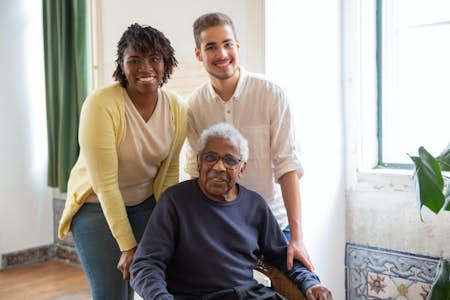Palliative, or end-of-life care, is the support given to individuals who have life-limiting conditions or diseases. They may be in the last months or weeks of their life and need help controlling pain and managing coexisting conditions.
Palliative care gives the individual dignity and empowers them to have a say in their end-of-life care. As well as getting support with managing pain, individuals can also get help for mental health, social, and spiritual needs.
Who is involved with palliative care?
Palliative care can involve just close family and friends, a wider healthcare team, or a specialist palliative care team. It depends on several factors such as:
- The life-limiting condition or diagnosis
- Whether the individual has the capacity to make their own decisions
- The support they currently get
GPs, physiotherapists, pharmacists, and social workers are just some of the professionals who may be involved in end-of-life care. In addition, there are specialist palliative healthcare professionals such as palliative care nurses. Their role can include administering pain relief or offering emotional support to family members. These professionals can work for the NHS; charities like Marie Curie often fund such workers and care, too.
What kind of conditions may need palliative care?
Each case of palliative care is unique to the individual. However, there are several types of serious illness or life-threatening conditions that may result in palliative care:
- Cancer
- Lung disease
- Heart disease
- Dementia or Alzheimer’s
Having one of these does not automatically mean that an individual requires palliative care. While we typically consider these conditions of older age, you may need palliative care at any age. These conditions will be treated and managed in line with the individual’s wishes or in their best interests if they cannot decide for themselves.
How are palliative care patients’ conditions treated?
Palliative medicine can focus on pain relief where serious illnesses and life-limiting conditions have progressed beyond treatment. This comes in many forms, including tablets, liquids, or injections. A GP can prescribe pain relief, which can then be administered at home by your caregivers or specialist-trained palliative care nurses. At the same time, you can still receive active treatment for conditions like cancer. The purpose of palliative care is to focus on patients’ overall quality of life. Any side effects from medications or pain relief will aim to be managed by healthcare professionals to promote comfort.
We spoke to Sue Learner, editor of carehome.co.uk and homecare.co.uk, about palliative care. Sue told Health Times: “The aim of end of life care is to help a dying person live as well as possible until they die. Generally, a ‘good death’ means the dying person was treated with dignity, compassion and respect by the people caring for them and kept clean and comfortable in familiar surroundings with people who were important to them close by.
"Although getting the correct care is hugely important, it is also crucial to make sure the person needing palliative care also gets the right financial support, as sorting out money worries can lighten the burden during this difficult time.
"There are Special Rules which mean people receiving palliative care can be fast-tracked to receive Universal Credit or Employment and Support Allowance (ESA).
"From 4 April 2022, the length of time that Special Rules are enforced were doubled so people who are terminally ill can benefit from them if they have a year or less to live – previously this was six months or less.
"As of May 2022, the Special Rules for End of Life have been extended to include Personal Independence Payment, Disability Living Allowance and Attendance Allowance."
Common terms used in palliative care
You may read or hear many terms when dealing with palliative care. These terms may refer to the type of care offered or the decisions made concerning palliative care. Some of the key ones are:
- End-of-life care: Care arranged to ensure comfort and dignity for the individual, including personal care to spiritual care.
- Terminal illness or life-limiting condition: A condition that has progressed past a point of treatment and will end in the individual passing away.
- Hospice care: Care provided to people diagnosed as terminal to end-of-life. They look after the emotional, spiritual, physical, and practical needs of patients, their families, and carers.
- Life-prolonging treatment: Treatments undertaken such as chemotherapy that treat life-limiting illnesses
- DNAR: An advance directive meaning carers won’t revive an individual if they go into cardiac arrest.
- Advanced care planning or advance decision: An advance decision outlining the individual’s wishes for care or treatments in certain circumstances, such as if they are receiving dementia or cancer treatment.
- Court of Protection: Decisions made by a court on behalf of an individual deemed to lack the capacity to make their own decisions.
- Power of Attorney: A document in which an individual grants another individual control over specific affairs or decisions, such as finances.
How do you get palliative care?
You can speak to your GP or primary care provider to learn more about palliative care. They will be able to make any referrals or pass on the details of local teams to contact. In addition, if you or a loved one is in a hospital or care home when you or they receive a diagnosis, the staff there can support you with making referrals to a palliative care team.
Alternatively, you can look into getting palliative care arranged privately through a care agency.
How is palliative care funded?
It depends on the individual’s circumstances, but the NHS typically covers it. However, some locations like hospices rely on charitable donations to operate. Private healthcare options are available and could be funded through private insurance if they meet the requirements.
To receive NHS funded care, healthcare professionals will make an assessment. Following this, social care professionals create a care package outlining the support needed. The individual and their loved ones can have full input into the care plan if they have the capacity to make decisions.
Where does palliative care take place?
Palliative care can take place in various locations such as a hospital, care home, hospice, or at home. Ideally, many wish to receive care at home, but this may not be possible due to various factors. However, the individual’s wishes are taken into account at all times to ensure they receive the best support.
If palliative care happens at home, healthcare professionals such as palliative care community nurses and carers will make regular visits. They can offer support for both the patient and their caregivers.
Advanced care planning for palliative care
Advanced care planning can ensure that your wishes are considered should you lose capacity. While advanced care planning is not legally binding, healthcare professionals will strongly consider it when making treatment decisions.
Promoting dignity and personal choice in palliative care
Palliative care is a difficult topic to broach, but it offers an opportunity to promote dignity. It allows you to consider your wishes and how to achieve them. Some individuals may want spiritual support from chaplains or to tick off some bucket list items. Palliative care aims to give choice and agency to the individual and their loved ones.
Support for carers and loved ones during palliative care
It can be easy to put aside emotions and needs when a loved one is unwell. But it is vital that carers and loved ones get support. Self-care is essential, not selfish, and ensures that carers are in the best place, emotionally and physically, to support the ill person. Self-care can include going for a walk, pursuing leisure activities, or catching up with a good friend.
Many charities offer support for carers and loved ones. The support available varies in each region and can include the services of palliative care specialists.
Palliative care is difficult for all involved. It can, however, offer the individual and their loved ones the opportunity for closure and essential time together. As palliative care focuses on the quality of life, people can live out their final weeks and months in as little pain as possible. Naturally, no one wishes to think about the topic of end-of-life care. However, it can be worthwhile to consider the individual’s wishes and those of the family and loved ones. This ensures that any decisions made consider the individual’s best interests and wishes.






